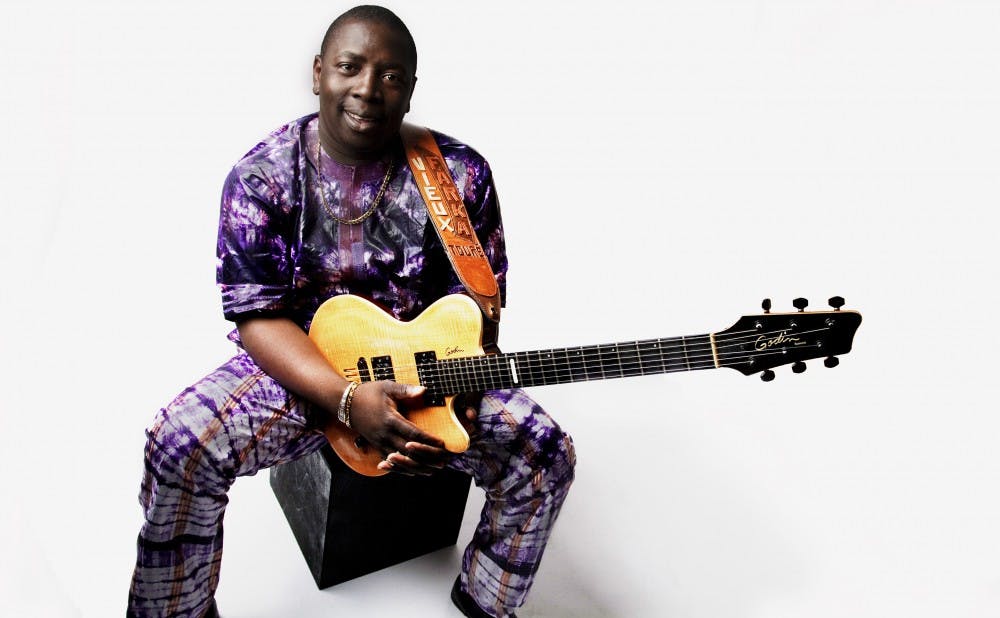On Saturday, Sep. 13, Duke Performances will host acclaimed Malian singer and guitarist Vieux Farka Touré in Reynolds Industries Theater. The performance is part of a worldwide tour for Touré that began in the Netherlands and ends in Asheville, N.C.
Vieux Farka Touré is most notably known as the son of Ali Farka Touré, a widely renowned and Grammy-winning guitarist notable for his style emerging from Malian tradition, but reminiscent of Mississippi blues. As a respected musician in his own right, Touré builds upon his father’s tradition, incorporating new styles and his own flair.
“It’s difficult to contend as a child of a famous musician to make a coherent and articulate statement, and I think that Vieux has done that,” said Aaron Greenwald, Director of Duke Performances. “He is an exceptional guitar player and a fine song-writer and a really compelling band leader. He’s very consciously and directly linked to his father’s legacy, but he’s carries on that tradition in a really admirable way.”
When asked by The Chronicle what it meant to follow in his father’s footsteps, Touré said it was a great responsibility both to his family and his community in Niafunke and in Bamako.
“I think like him, I am stubborn, but I am also someone who speaks very clearly and makes sure I am understood, like he used to do,” said Touré. “Musically, I have taken a bit of a different path from him, experimenting with more kinds of music. But he did this as well in his time. My music is an extension of his music in many ways, you could say, but it is music for the new generation.”
Touré's music is emblematic of an international music legacy born out of his father’s worldwide prominence and the general acclaim of Malian musicians. Northern Mali is home to a nomadic desert people called the Tuareg, notable for their musical traditions and the famous rebel band Tinariwen. In honor of this rich tradition, in a few weeks, Duke Performances will also be hosting fellow Malian musicians Toumani Diabaté and Sidiki Diabaté, famous for their playing of the kora, a 21-stringed instrument popular in Western Africa.
“Mali is famous, more than any other African country, for producing musicians with some degree of popularity worldwide,” said Greenwald. “It is partly the fact that it is a landlocked country, surrounded by seven different countries. It is geographically and ethnically diverse. It is constantly assimilating inputs both from North Africa and West Africa, and also these French colonial inputs. It’s a really rich mix.”
While Touré’s music has always been remarkable for its craft, current events in Mali have put his music into a more political light. In 2012, radical Islamist guerrillas took control of northern Mali and instituted Sharia law, outlawing music. In 2013, Touré released “Mon Pays,” which translates to “My Country,” as an ode to Mali.
“Music is incredibly important in Mali. In Mali, music is food for the soul,” Touré said. “Music can inspire the hearts of men and women, and it can provide joy and strength in times of great despair. I am like an ambassador for the music and culture of Mali. All of the artists from Mali who tour internationally hold this responsibility. We must educate the world outside Mali about the beauty and profundity of our culture, especially now when there are very serious threats to our culture.”
Although the political tensions have lessened since the release of the album, Touré’s music still resonates across the globe for its immediacy. Touré sees music as not only a political statement, but also as a means of communion with people from around the block and around the world.
“I draw inspiration from my family, from my country, from the political situations that I see around the world that disturb me…from many different sources,” said Touré. “Music for me is my medicine and also my way of expressing most directly what’s in my heart. I hope the listeners of my music in the U.S.A. are inspired by the music to stretch their imagination, to open their hearts and, most importantly, to dance and have fun.”
Touré's performance on Saturday promises to do just that.
“I think we want music and art to be something other than constantly and perpetually earthbound,” said Greenwald. “We want it to be mysterious and powerful and to require engagement. That’s why we sing instead of speak! We want music to be transcendent.”
Vieux Farka Touré performs in Reynolds Industries Theater on Saturday, Sept. 13, at 8 p.m. Tickets are $10 for Duke Students and can be purchased at the box office. Go to dukeperformances.duke.edu for more information.
Get The Chronicle straight to your inbox
Signup for our weekly newsletter. Cancel at any time.

